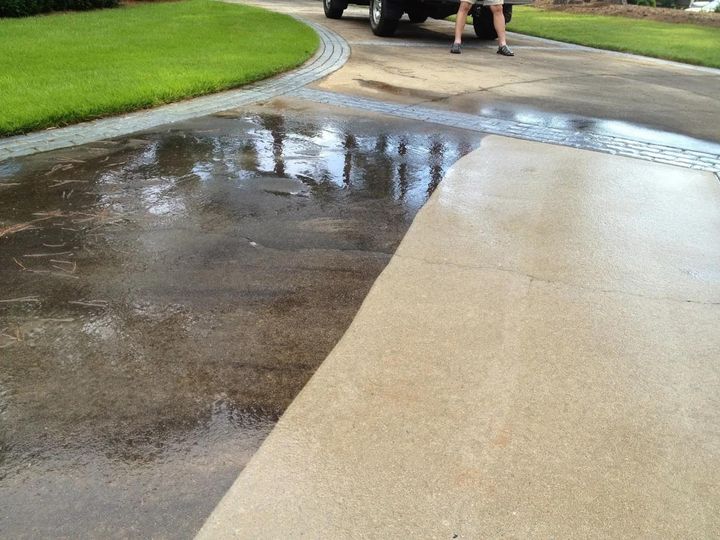%201%20(1).webp)
%201%20(1).webp)

The Importance of Quality Pavement Maintenance


Resolving Water Pooling Issues on Your Columbus Asphalt Driveway
During the summer in Columbus, heavy rain followed by intense heat can make driveway problems more obvious. One of the most common issues homeowners run into is water pooling on their asphalt driveway. It may start off as a minor concern, but over time, standing water can soften the asphalt, create weak points, and lead to surface damage that spreads fast.
Ignoring water collection on the surface doesn't just affect appearance. It weakens the driveway from underneath, raising the chance of potholes, cracks, and long-term erosion. Addressing pooling early can help protect your investment and extend the life of your driveway. Understanding where the issue comes from and figuring out the right fix makes all the difference.
Causes of Water Pooling on Asphalt Driveways
Asphalt driveways are designed to move water away from the surface. When pooling happens, something has likely gone wrong either with the way the driveway was built, how it’s currently draining, or due to age-related problems. Knowing the cause helps you decide the next step.
Here are the main reasons driveways in Columbus often develop water pooling problems:
1. Poor Drainage Systems
Some driveways are installed with no attention to proper drainage. Without enough slope or the right drain points, water gets trapped. Gutters or downspouts that pour water directly onto the driveway can also contribute to this issue.
2. Improper Slope and Grading
Driveways should be graded so that water naturally runs off to the sides. When the slope is off, even by a small margin, it can create low spots where water stays after a rain. This is especially common when a driveway wasn’t installed with accurate leveling or if soil has shifted over time below the surface.
3. Wear and Tear of Asphalt Surface
Over the years, asphalt wears down, loses structure, and begins forming dips or impressions, especially in areas where heavy vehicles are parked regularly. These shallow dips can hold water that slowly penetrates through the surface, causing deeper damage underneath.
Each of these causes may contribute on their own or combine with others, depending on the age of the driveway and the surrounding terrain. For example, if your Columbus home is on uneven land or near a sloped yard, grading issues might be more likely. Either way, proper evaluation is the key to getting to the root of the problem.
Assessing the Severity of Water Pooling
Spotting puddles isn’t difficult, but figuring out how serious the problem is often takes a closer look. During hotter months, water may evaporate fast, which can make things look less urgent than they are. But signs of pooling are only part of the story. Get into the habit of checking for uneven surfaces or water trails after a rainstorm.
Here’s how residential property owners in Columbus can begin identifying the severity of driveway pooling:
- Do a visual check right after rainfall. Note where water collects, how big the puddles are, and how long it takes to drain or dry out.
- Use a long straight board or level to test whether the surface slopes correctly. If you notice dips in the asphalt, even slight ones, those areas may be at risk.
- Look for darkened spots or cracking around where puddles form. These could be signs that water has already started seeping in.
- Pay attention to nearby landscaping or curbs. Water that flows toward the driveway instead of away could point to a larger drainage issue with yard grading.
For homeowners who still aren't sure how serious the issue is, a water test can help. Running water along the high side of the driveway and observing where it travels can reveal how the slope is performing. If water stays in place or moves toward the home, the setup might need correcting.
Catch the problem early and you'll likely only need surface-level fixes. Wait too long, and water can soak through the asphalt base, which may require more involved repair work. It's better to catch these signs before they build into costlier problems.
Effective Solutions for Resolving Water Pooling
Once water pooling has been identified on your asphalt driveway, the next step is solving it before the damage worsens. Solutions should target both surface-level trouble spots and underlying factors such as improper slope or poor drainage design. For most Columbus homes, short-term fixes won’t cut it. Lasting results require proper planning and execution.
Here are three proven ways to fix water pooling on asphalt driveways:
1. Improving Driveway Drainage
In many cases, adding or adjusting drainage channels can significantly reduce pooling. This may include installing a trench drain along the edge, fixing downspout exits so they don't empty directly onto the driveway, or redirecting runoff to a more controlled area. Simple changes like adding gravel strips or redirecting gutter flow can help keep water from settling on the surface.
2. Correcting Slope and Grading Problems
If the driveway’s slope doesn’t allow for proper runoff, regrading may be necessary. Our technicians can assess the current pitch of the surface and adjust it so water flows away from the home and doesn’t collect in the middle. Sometimes this means resurfacing the section completely to regain proper slope. This type of structural adjustment is often more reliable than small patch jobs when the problem area is widespread.
3. Repairing and Sealcoating the Asphalt Surface
Dips and cracks caused by aging or poor drainage need to be filled to stop additional water entry. Patching repairs are used to fix sunken spots, while crack sealing can stop moisture from getting through to the base layer. Once repairs are made, applying a fresh asphalt sealcoat helps protect the surface from water penetration, surface erosion, and future wear.
Each fix works better when paired properly with the others. For example, sealing a driveway without correcting the slope will only keep water sitting on the surface. For Columbus homeowners, a combined approach generally gives the best long-term outcome.
Preventive Measures to Avoid Future Water Pooling
Once pooling is fixed, it’s just as important to keep it from coming back. Driveways endure a lot over the seasons, especially with fluctuating temperatures and heavy rain in the summer months. The key to prevention is staying ahead of wear and reacting to small changes before they get bigger.
Here are three consistent maintenance habits that help lower the risk of new water pooling problems:
- Inspect the driveway regularly
Schedule a walk-through after storms. Check for pooling, fresh cracks, or new dips. Early signs are easier and less expensive to handle.
- Manage water flow from other sources
Make sure roof runoff systems like gutters and downspouts point away from the driveway. If the downspouts empty too close, consider extending them or using splash blocks to redirect flow.
- Stick to a sealcoating schedule
Sealcoating every few years adds a barrier between water, sun exposure, and your asphalt. It helps prevent cracking, slows oxidation, and keeps moisture from seeping below the surface.
As an example, a homeowner in northeast Columbus noticed some small puddles forming after each rainfall. While nothing felt soft underfoot yet, they had a technician examine the area. Turns out, a slight shift in soil over the years caused a grade issue near the garage. By taking action early and resealing the surface after correcting the slope, they avoided more expensive structural repairs down the line.
Protect Your Driveway for the Long Term
Water pooling creates more than an eyesore. It speeds up asphalt wear, causes cracks to deepen, and leads to problems below the surface. Once those issues spread, the costs rise quickly. Staying on top of drainage, slope, and regular maintenance makes a major difference in keeping your driveway solid and safe.
Protecting your asphalt driveway in Columbus requires more than one quick fix. It’s about building a plan that starts with the right repairs and follows with consistent upkeep. Regular inspections, thoughtful drainage upgrades, and professional sealcoating all work together to reduce risk and increase how long your surface lasts. Taking action now can help you avoid larger repair costs later.
If water pooling continues to compromise your driveway's durability, now is the time to invest in long-term solutions. At Professional Pavement Services, our team is committed to helping Columbus homeowners extend the life of their driveways by addressing issues like improper drainage and uneven grading with effective repairs and maintenance. One of the most reliable methods to protect your surface from further damage is through asphalt sealcoating in Columbus, which can safeguard against moisture and wear. For a quick estimate or to book a service visit, please contact us today.
Recent Posts

Join Our Community of Readers
Stay updated with our latest insights and share your thoughts with us in the comments!


.svg)












.png)




